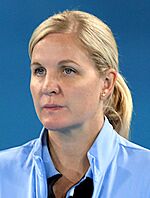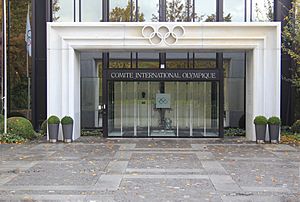President of the International Olympic Committee facts for kids
The President of the International Olympic Committee (IOC) is like the main leader of the team that runs the Olympic Games. This person is in charge of making sure everything works well for the IOC and the Games. The IOC Executive Board, which helps the President, includes four vice-presidents and ten other members. All these leaders are chosen by a special vote of the IOC members.
The IOC is the group that organizes the modern Olympic Games. These exciting events happen every two years, with the Summer and Winter Games taking turns (each held every four years). The IOC President can serve for up to two terms, which means they could lead the organization for many Olympic Games!
Quick facts for kids President of the International Olympic Committee |
|
|---|---|
 |
|

|
|
| International Olympic Committee | |
| Member of | IOC Executive Board |
| Residence | Lausanne Palace |
| Seat | IOC Headquarters, Lausanne, Switzerland |
| Appointer | IOC Session
Elected by the IOC Members by secret ballot
|
| Term length | Term of eight years
Renewable once for four years
|
| Constituting instrument | Olympic Charter |
| Formation | 1894 |
| First holder | Demetrios Vikelas |
| Website | International Olympic Committee |
Contents
- Leaders of the Olympic Movement
- Demetrios Vikelas: First IOC President (1894–1896)
- Pierre de Coubertin: Olympic Visionary (1896–1925)
- Henri de Baillet-Latour: Leading Through Change (1925–1942)
- J. Sigfrid Edström: Post-War Revival (1942–1952)
- Avery Brundage: Upholding Amateurism (1952–1972)
- Michael Morris: Navigating Challenges (1972–1980)
- Juan Antonio Samaranch: Financial Turnaround (1980–2001)
- Jacques Rogge: Modernizing the Games (2001–2013)
- Thomas Bach: Leading into the Future (2013–2025)
- Kirsty Coventry: A New Era (from June 2025)
- See also
Leaders of the Olympic Movement
At first, people thought the leader of the country hosting the Games should be the IOC President. But this idea changed quickly. In over 130 years, only 10 people have been chosen to lead the IOC. The tenth president started their role in June 2025.
| No. | Portrait | Name (Birth–Death) |
Term of office | Country of origin | ||
|---|---|---|---|---|---|---|
| Took office | Left office | Time in office | ||||
| 1 | 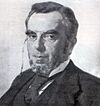 |
Demetrius Vikelas (1835–1908) |
28 June 1894 | 10 April 1896 | 1 year, 287 days | |
| 2 | 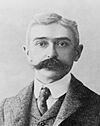 |
Pierre de Coubertin (1863–1937) |
10 April 1896 | 28 May 1925 | 29 years, 48 days | |
| 3 | 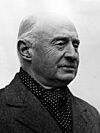 |
Henri de Baillet-Latour (1876–1942) |
28 May 1925 | 6 January 1942 (died in office) |
16 years, 223 days | |
| 4 | 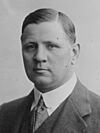 |
J. Sigfrid Edström (1870–1964) |
6 January 1942 6 September 1946 |
6 September 1946 15 August 1952 |
4 years, 243 days (acting) 5 years, 344 days |
|
| 5 | 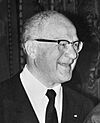 |
Avery Brundage (1887–1975) |
15 August 1952 | 11 September 1972 | 20 years, 27 days | |
| 6 | 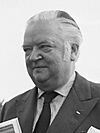 |
Michael Morris (1914–1999) |
11 September 1972 | 3 August 1980 | 7 years, 327 days | |
| 7 | 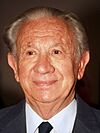 |
Juan Antonio Samaranch (1920–2010) |
3 August 1980 | 16 July 2001 | 20 years, 347 days | |
| 8 | 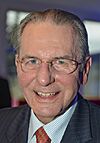 |
Jacques Rogge (1942–2021) |
16 July 2001 | 10 September 2013 | 12 years, 56 days | |
| 9 | 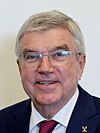 |
Thomas Bach (born 1953) |
10 September 2013 | 23 June 2025 | 12 years, 159 days | |
| 10 | 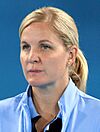 |
Kirsty Coventry (born 1983) |
23 June 2025 | incumbent | 238 days | |
Demetrios Vikelas: First IOC President (1894–1896)
Pierre de Coubertin first tried to bring back the Olympic Games in 1892. He got people excited, but couldn't get a firm commitment. He tried again at a meeting in 1894. This meeting was about amateur sports and bringing back the Games.
Coubertin got help from important people like Edward VII, Crown Prince Constantine of Greece, and William Penny Brookes. He also reached out to Ioannis Phokianos, a Greek professor who loved sports. Since Phokianos couldn't travel, Coubertin invited Demetrios Vikelas, a well-known Greek person in Paris. Athens was chosen to host the first modern Olympic Games in 1896. Because Greece was the original home of the Olympics, Vikelas was chosen as the first IOC President.
Pierre de Coubertin: Olympic Visionary (1896–1925)
Pierre de Coubertin became IOC President after Demetrios Vikelas stepped down. Even though the first Games were a success, the Olympic Movement faced tough times. The 1900 and 1904 Games didn't get much attention because they were overshadowed by big World's Fairs.
The 1906 Intercalated Games helped bring back excitement. The Olympic Games then grew into the biggest sports event in the world. De Coubertin created the modern pentathlon for the 1912 Games. He also designed the Olympic flag and Olympic rings in 1913. In 1915, he chose Lausanne, Switzerland, as the permanent home for the IOC. He decided to step down after the 1924 Games, which were much more successful than the 1900 Paris Games. Henri de Baillet-Latour took over as President in 1925. De Coubertin remained an honorary president until he passed away in 1937.
Henri de Baillet-Latour: Leading Through Change (1925–1942)
Henri de Baillet-Latour was elected IOC President in 1925. He took over after Baron de Coubertin, the founder of the modern Olympic Movement, became honorary president. The Belgian Count led the IOC until he passed away in 1942. His vice-president, J. Sigfrid Edström, then took over.
J. Sigfrid Edström: Post-War Revival (1942–1952)
When Henri de Baillet-Latour died in 1942, J. Sigfrid Edström became the acting president. He officially became IOC President after World War II. He played a very important part in bringing the Olympic Movement back to life after the war.
In 1931, Edström was involved in a difficult decision. They banned famous Finnish runner Paavo Nurmi from competing in the 1932 Games. The IOC thought Nurmi was a professional athlete, which was not allowed then. This decision caused some tension between Finland and Sweden. Edström retired from the IOC presidency in 1952. Avery Brundage became the next president.
Avery Brundage: Upholding Amateurism (1952–1972)
Avery Brundage became IOC President in 1952. During his time, Brundage strongly believed that only amateur athletes should compete in the Olympic Games. This meant athletes should not be paid for their sport. This view became less popular over time. For example, Austrian skier Karl Schranz was not allowed to compete in the 1972 Winter Olympics because of this rule.
Brundage also opposed giving back Olympic medals to Jim Thorpe. Thorpe was a Native American athlete who had played semi-professional baseball before the 1912 Olympics. Brundage believed this made him not an amateur. However, Brundage did not object to athletes from some countries who were paid by their governments to train full-time. He called this "their way of life." After Brundage retired, Thorpe's amateur status was restored. The IOC officially gave his medals back to his family in 1982.
Brundage also believed that sports should not be mixed with politics. At the 1968 Summer Olympics in Mexico City, U.S. sprinters Tommie Smith and John Carlos raised their fists to support the Black Power movement. Brundage ordered them to be removed from the Olympic team. He even threatened to ban the entire U.S. team if they refused. However, he did not object to Nazi salutes at the 1936 Berlin Olympics.
Brundage is also remembered for his decision during the 1972 Summer Olympics in Munich. After a terrible terrorist attack killed eleven Israeli athletes, Brundage decided to continue the Games. He said, "The Games must go on...." While some people criticized his decision, most did not. The Olympic competition was paused for one day. The next day, a memorial service was held. Brundage retired as IOC president after the 1972 Games, after serving for twenty years. Michael Morris became the next president.
Michael Morris, 3rd Baron Killanin became the IOC President in August 1972. This was just before the 1972 Summer Olympics in Munich. The Olympic Movement faced a tough time during his presidency. They had to deal with the aftermath of the Munich tragedy. They also faced financial problems from the 1976 Montréal Games.
Because few cities wanted to host the Games, Lake Placid, New York and Los Angeles, California were chosen to host the 1980 Winter Games and 1984 Summer Games without other cities competing. Killanin resigned before the 1980 Summer Olympics in Moscow. This was after many countries decided to boycott those Games to protest the Soviet invasion of Afghanistan. He stayed in his role until the Games were finished.
Juan Antonio Samaranch: Financial Turnaround (1980–2001)
Juan Antonio Samaranch was elected President of the IOC in July 1980. He officially took over after the Moscow Olympics ended. During his time, Samaranch made the Olympic Movement financially strong. He secured big television deals and sponsorships. Even though the 1984 Summer Olympics were boycotted by some countries, a record number of athletes still took part. The number of nations joining the IOC and participating in the Games grew during his presidency. Samaranch also wanted the best athletes to compete, which led to professional athletes slowly being allowed in the Olympics.
One of Samaranch's biggest achievements was saving the IOC financially. The Games had become so expensive for host cities that it was hard to find new hosts. Under Samaranch, the IOC changed its sponsorship rules. This brought in a lot of money.
Criticism and Controversies
Samaranch was sometimes criticized for how he was addressed and his travel arrangements. He was also criticized for issues like unfair judging and some IOC members taking bribes. An investigation later removed some IOC members for accepting bribes, but Samaranch was cleared of any wrongdoing. It became a tradition for Samaranch to say that each Summer Olympics was "the best ever" Games when he closed them.
Jacques Rogge: Modernizing the Games (2001–2013)
Jacques Rogge was elected as president of the IOC in July 2001. He took over from Juan Antonio Samaranch. Under Rogge's leadership, the IOC wanted to make it easier for developing countries to host the Olympic Games. He believed this could happen by making the Games smaller, simpler, and less expensive.
At the 2002 Salt Lake City Olympics, Rogge was the first IOC president to stay in the Olympic village. He wanted to be closer to the athletes. Rogge retired in 2013 and was given the lifetime title of Honorary President of the IOC. He passed away in 2021.
Challenges and Decisions
For the 2008 Summer Olympics in Beijing, Rogge initially said there would be no internet censorship for foreign media. However, it was later admitted that the internet would be censored for journalists. Rogge later denied knowing about any secret deal for censorship.
Rogge also commented on Usain Bolt's celebrations after winning the 100 meters in Beijing. He felt Bolt should show more respect for his competitors. Rogge later clarified that he only meant Bolt's gestures during the race were a little disrespectful.
He did not agree to a minute of silence for the 40th anniversary of the 1972 Munich Games attack during the opening ceremonies of the 2012 Summer Olympics. Instead, he and the IOC chose to hold smaller ceremonies in London and at Fürstenfeldbruck Air Base.
Thomas Bach: Leading into the Future (2013–2025)
Thomas Bach was elected President of the IOC in September 2013. He took over from Jacques Rogge. He made his first appearance at the 2014 Winter Olympics in Sochi, Russia. Bach was one of the IOC presidents who also took part in other sporting events. His term ended in June 2025.
Kirsty Coventry: A New Era (from June 2025)
Kirsty Coventry was elected President of the IOC on March 20, 2025. She took over from Thomas Bach. She is the first female and first African IOC president.
Kirsty Coventry wants the Olympics to be very inclusive. This means making sure athletes from all countries have equal chances to compete and do well. She hopes to bring athletes together beyond political differences. Coventry also plans for the IOC to work more closely with important global powers, like the BRICS nations. She believes sports can be a universal language that connects everyone.
See also
- Presidents of the International Paralympic Committee
 | Charles R. Drew |
 | Benjamin Banneker |
 | Jane C. Wright |
 | Roger Arliner Young |


